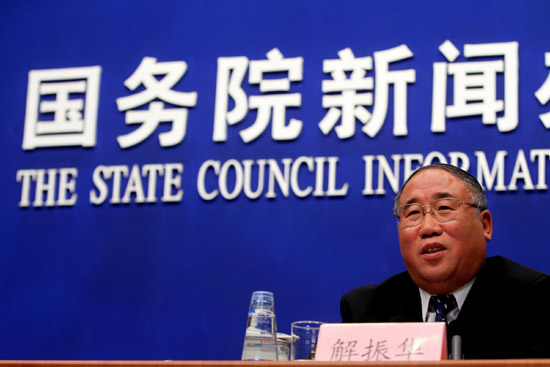China reaffirms stance on climate change
Updated: 2011-11-22 10:59
(Xinhua)
|
|||||||||||
 |
|
Xie Zhenhua, head of the Chinese delegation to the Durban meeting, speaks at a press conference in Beijing, Nov 22, 2011. [Photo/Xinhua] |
BEIJING - China on Tuesday reiterated that the Kyoto Protocol is an important and legally binding multi-lateral agreement and must be adhered to during the upcoming climate talks in South Africa's city of Durban.
Xie Zhenhua, head of the Chinese delegation to the Durban meeting, said China will stick to the same stance as other developing nations in pursuing the second commitment period of the Kyoto Protocol.
The protocol reflects "common but differentiated responsibilities" and commitment to the protocol is a foundation of political trust. Xie made the remarks upon the release of a government white paper at a press conference in Beijing.
Xie also said that after the Copenhagen Conference, many nations, especially developing ones, created domestic policies and measures to control emissions. Developing nations accounted for 57 percent of global emission reductions after the 2009 conference, he said, compared to 43 percent for developed nations.
"We hope the nations of the world will translate their political willingness into concrete action," he said.
Xie said China's greenhouse gas emissions are currently on the rise as a result of the country's rapid and ongoing urbanization.
Xie said climate problems used to be ignored when developed countries were in the process of industrialization and urbanization. These countries reached their emission peak when their per capita gross domestic product (GDP) reached approximately $40,000, he said.
Xie said China started to take action to address the problems when the country's per capita GDP reached $4,000.
"China will take active measures to reduce emissions and ensure that its carbon dioxide emission peak will arrive earlier," Xie said.
The country is also making efforts to boost non-fossil fuel development and restructure energy consumption to reduce reliance on coal, which currently accounts for around 70 percent of the nation's energy consumption.
"China is willing to undertake its due responsibilities in accordance with the country's development," Xie said.
However, he warned that China faces a great challenge in meeting this year's goal of reducing energy consumption per unit of economic output by around 3 percent. Energy consumption fell by just 1.6 percent during the first three quarters.
Related Stories
China to establish climate change think tank 2011-11-22 09:13
China to help developing countries cope with climate change 2011-11-21 21:11
Hot Topics
HIV/AIDS, Egypt protest, Thanksgiving, climate change, global economic recovery, home prices, high-speed railways, school bus safety, Libya situation, Weekly photos
Editor's Picks

|

|

|

|

|

|







